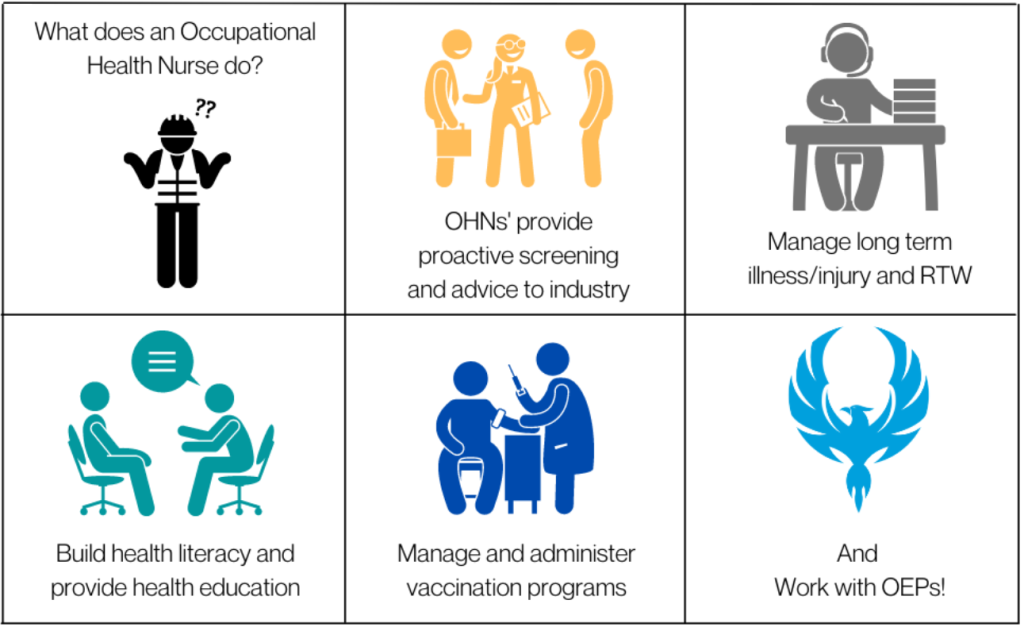
Table of Contents
Embarking on a PhD journey is a challenging yet rewarding endeavor, particularly in the specialized field of occupational health nursing. This demanding field requires a deep understanding of workplace hazards, preventive measures, and the promotion of employee well-being. A thesis on occupational health nursing allows you to delve into this critical area, contributing to the knowledge base and influencing practice.
This comprehensive guide aims to equip aspiring scholars with the tools and insights needed to navigate the complex process of writing a successful thesis on occupational health nursing.
Steps to Crafting a PhD Thesis on Occupational Health Nursing
1. Choosing a Compelling Research Topic:
The first crucial step is selecting a thesis on occupational health nursing topic that aligns with your interests and research goals. This involves brainstorming potential areas within the vast field of occupational health nursing that resonate with you. Consider current trends, gaps in existing knowledge, and emerging challenges in workplace health.
Here are some avenues for inspiration:
- Workplace Violence and Harassment: Investigate the prevalence, impact, and effective interventions for addressing workplace violence and harassment in specific industries.
- Mental Health in the Workplace: Explore the impact of mental health issues like burnout, anxiety, and depression on employee well-being and productivity, and develop evidence-based strategies for prevention and management.
- Ergonomics and Musculoskeletal Disorders: Examine the role of ergonomics in preventing musculoskeletal disorders, focusing on specific work environments or tasks, and propose innovative interventions.
- Occupational Cancer Prevention: Study the prevalence of occupational cancers, identify risk factors, and evaluate the effectiveness of existing prevention strategies in specific occupational settings.
- Emerging Workplace Hazards: Investigate the impact of novel technologies, such as artificial intelligence or virtual reality, on occupational health and safety, and develop appropriate guidelines for their safe and healthy integration.
2. Developing a Robust Research Question:
Once you’ve identified a potential area of focus, craft a clear and specific research question that drives your thesis on occupational health nursing. This question should be focused, researchable, and relevant to the field. A strong research question provides a roadmap for your study and guides your research design and methodology.

For instance, instead of a broad question like “How can we improve occupational health in the workplace?” consider a more focused question:
- “What are the factors contributing to burnout among nurses in intensive care units and what interventions can mitigate these risks?”
3. Conducting a Comprehensive Literature Review:
A thorough literature review is essential for a thesis on occupational health nursing. It provides a foundation for your research, identifies existing knowledge, and highlights gaps that your study can address. Consult a range of relevant scholarly sources, including peer-reviewed journals, books, and reports, to gain a comprehensive understanding of the field.
Key aspects to focus on:
- Identify and analyze key concepts: Understand the theoretical frameworks, definitions, and methodologies relevant to your chosen topic.
- Synthesize existing research: Summarize and critically evaluate the findings of previous studies related to your research question.
- Identify gaps and opportunities: Highlight areas where research is lacking and propose how your study can contribute new knowledge.
- Develop a conceptual framework: Use the findings of your literature review to build a theoretical framework that will guide your research design and analysis.
4. Designing a Rigorous Research Methodology:
The methodology section of your thesis on occupational health nursing describes how you will answer your research question. This section should be detailed and transparent, outlining your research approach, data collection methods, and analysis techniques.
Common methodologies for a thesis on occupational health nursing:
- Quantitative research: Utilize numerical data collected through surveys, questionnaires, or observational studies to test hypotheses and explore relationships between variables.
- Qualitative research: Employ in-depth interviews, focus groups, or ethnographic observations to gather rich, narrative data and understand the lived experiences of participants.
- Mixed methods research: Combine quantitative and qualitative approaches to gain a comprehensive understanding of a complex phenomenon.
Important considerations for your research design:
- Ethical considerations: Ensure your study adheres to ethical guidelines for research involving human participants, including informed consent and data privacy.
- Sampling strategy: Choose a sample size and sampling technique appropriate for your research question and methodology.
- Data analysis: Select appropriate statistical or qualitative analysis techniques to analyze your data and answer your research question.
5. Gathering and Analyzing Data:
Once you have established your research methodology, the next step is to gather data relevant to your thesis on occupational health nursing. This might involve conducting surveys, interviews, or observations, depending on your research design. It is critical to ensure data accuracy, reliability, and validity throughout this process.
Key aspects of data analysis:
- Data cleaning and coding: Organize and prepare your data for analysis, using appropriate coding schemes if necessary.
- Quantitative analysis: Employ statistical software to analyze numerical data, calculate descriptive statistics, and test hypotheses.
- Qualitative analysis: Use thematic analysis, content analysis, or narrative analysis to identify patterns and themes in qualitative data.
- Interpretation and discussion: Analyze and interpret your findings in relation to your research question, existing literature, and broader theoretical frameworks.
6. Crafting a Coherent Thesis Narrative:
The final stage involves weaving together your research findings and presenting a cohesive narrative that contributes to the field of occupational health nursing. Your thesis on occupational health nursing should be a comprehensive and engaging document that communicates your research journey, findings, and implications clearly and convincingly.
Key elements of a successful thesis narrative:
- Introduction: Clearly state your research topic, research question, and the significance of your study within the broader field of occupational health nursing.
- Literature review: Provide a detailed and critical review of existing literature related to your research topic.
- Methodology: Describe your research design, data collection methods, and analysis techniques in detail.
- Results: Present your findings in a clear and concise manner, using tables, figures, and charts to visualize data and support your interpretations.
- Discussion: Discuss your findings in relation to your research question, existing literature, and broader theoretical frameworks.
- Conclusion: Summarize your findings, highlight their implications for practice, and suggest future research directions.

7. Defending Your Thesis:
After completing your thesis, you will be required to defend your work in a formal oral examination, often referred to as a “viva voce.” This is an opportunity to showcase your understanding of your research, respond to questions from your examiners, and demonstrate the value of your contributions to the field of occupational health nursing.
Preparing for your thesis defense:
- Practice your presentation: Rehearse your presentation multiple times, focusing on clarity, coherence, and addressing potential questions.
- Prepare for questions: Anticipate possible questions from your examiners based on your thesis content, methodology, and findings.
- Be confident and articulate: Demonstrate your knowledge and passion for your research, clearly and concisely explaining your findings and their implications.
8. The Impact of Your Thesis on Occupational Health Nursing:
A well-conducted thesis on occupational health nursing has the potential to significantly impact the field. Your findings can inform best practices, contribute to policy development, and influence the design of intervention strategies to improve the health and well-being of workers.
Potential contributions:
- Identifying emerging health risks: Your research may uncover new or understudied workplace hazards, leading to the development of preventative measures.
- Developing evidence-based interventions: You can contribute to the development of effective interventions for addressing specific workplace health issues, such as musculoskeletal disorders, mental health challenges, or exposure to hazardous substances.
- Advocating for worker safety and health: Your research can be a powerful tool for advocating for workplace policies and regulations that promote worker well-being.
9. The Value of Perseverance and Support:
Writing a thesis on occupational health nursing is a challenging undertaking, but it is a journey of intellectual growth and discovery. It is crucial to remain persistent and focused throughout the process. Seek support from your supervisors, peers, and other mentors, and remember to prioritize your well-being throughout the process.
Remember:
- Your passion for occupational health nursing will be your driving force.
- Be patient with yourself and the process.
- Embrace challenges as opportunities for learning and growth.
By following these steps and embracing the complexities of the field, you can successfully complete your thesis on occupational health nursing and make a meaningful contribution to the advancement of workplace health and safety.
Navigating the Pitfalls of a Thesis on Occupational Health Nursing
Writing a thesis on occupational health nursing is a challenging but rewarding endeavor. It requires a deep understanding of the field, meticulous research, and a strong narrative to effectively convey your findings. However, there are several common pitfalls that can derail your progress and impact the quality of your work. Here’s a guide to help you avoid these pitfalls:
1. Narrowing Your Scope Too Much (or Not Enough):
A thesis on occupational health nursing should be focused enough to be manageable but broad enough to offer significant contributions to the field. Avoid choosing a topic that’s overly specific, as it might limit your research opportunities and prevent you from exploring broader implications. Conversely, choosing a topic that’s too broad can lead to an overwhelming amount of data and make it difficult to synthesize your findings effectively.
2. Relying Solely on Secondary Research:
While secondary research is essential for laying the groundwork for your thesis on occupational health nursing, relying solely on existing literature can limit the depth of your analysis. Primary research through surveys, interviews, or case studies can provide valuable insights and add a unique dimension to your work.
3. Lack of Clear Research Question(s):
A thesis on occupational health nursing should be driven by a clear and well-defined research question(s). Without a clear direction, your research can become unfocused and your findings might be unclear or lack coherence. Develop a strong research question(s) that guides your research and ensures your findings are relevant and impactful.
4. Ignoring Ethical Considerations:
When conducting research for a thesis on occupational health nursing, it’s crucial to adhere to ethical guidelines. This includes obtaining informed consent from participants, ensuring confidentiality and anonymity, and minimizing potential risks. Failing to address ethical concerns can seriously undermine the credibility of your work.
5. Neglecting Writing and Presentation Skills:
A thesis on occupational health nursing should be written in a clear, concise, and engaging manner. Invest time in developing your writing skills and ensure your thesis is well-structured and organized. Additionally, practice presenting your research effectively to ensure your findings are well-received and understood.
6. Not Seeking Sufficient Feedback:
Don’t be afraid to seek feedback from your supervisor, peers, and other experts. Regularly reviewing your work and incorporating constructive criticism will significantly improve the quality and clarity of your thesis on occupational health nursing.
Avoiding these common pitfalls and carefully planning your research will enable you to write a compelling and impactful thesis on occupational health nursing that contributes meaningfully to the field.
Demystifying the Thesis on Occupational Health Nursing: FAQs Answered
A thesis on occupational health nursing is a comprehensive academic undertaking that delves into a specific area within this specialized field. It often represents the culmination of years of study and research, and can be a daunting prospect for aspiring nurses. However, with a clear understanding of the process and a well-defined research question, a thesis on occupational health nursing can be both rewarding and impactful.

Here we address some common questions about this type of thesis, shedding light on its purpose, process, and potential outcomes:
1. What is the Purpose of a Thesis on Occupational Health Nursing?
A thesis on occupational health nursing aims to contribute to the body of knowledge surrounding the field. It seeks to explore a specific problem, analyze existing data, propose new solutions, and potentially influence future practice. The purpose can be broadly classified into:
- Exploring a New Area: Identifying gaps in current research and investigating new or emerging issues within occupational health nursing.
- Testing Existing Theories: Critically evaluating established concepts and proposing adjustments or improvements based on new evidence.
- Developing Practical Interventions: Investigating the efficacy of novel programs or strategies to improve worker health and safety.
2. What are the Common Research Areas for a Thesis on Occupational Health Nursing?
The scope of a thesis on occupational health nursing is vast, encompassing various aspects of workplace health. Some common areas of research include:
- Ergonomics and Musculoskeletal Disorders: Investigating factors contributing to workplace injuries and developing ergonomic solutions.
- Stress Management and Mental Health: Exploring the impact of workplace stressors on employee well-being and proposing interventions to promote mental health.
- Environmental Health and Safety: Analyzing workplace hazards and developing strategies for risk mitigation and workplace safety.
- Workplace Violence and Harassment: Investigating the prevalence of workplace violence and proposing strategies for prevention and intervention.
- Health Promotion and Disease Prevention: Developing programs and campaigns to promote healthy behaviors and prevent chronic diseases in the workplace.
3. How do I Choose a Topic for My Thesis on Occupational Health Nursing?
Selecting a suitable topic for your thesis on occupational health nursing is crucial. Consider your interests, skills, and available resources.
- Personal Interest: Choose a topic that genuinely excites you and aligns with your career goals.
- Literature Review: Explore existing research to identify gaps in knowledge and promising areas for investigation.
- Feasibility: Ensure that the topic is manageable within your timeframe and available resources.
- Supervisory Guidance: Discuss your potential research ideas with your supervisor for their expert feedback.
4. What are the Steps Involved in Completing a Thesis on Occupational Health Nursing?
Completing a thesis on occupational health nursing involves a systematic process:
- Topic Selection: Identify a relevant and researchable topic.
- Literature Review: Thoroughly review existing research to establish a theoretical framework and identify knowledge gaps.
- Methodology: Choose a suitable research design and methodology to answer your research question.
- Data Collection: Gather data through methods such as surveys, interviews, observations, or existing data analysis.
- Data Analysis: Analyze the collected data using appropriate statistical techniques or qualitative analysis methods.
- Report Writing: Present your findings in a clear and concise manner, following academic writing conventions.
- Defense: Present your thesis to a panel of examiners and defend your findings.
5. What are the Potential Benefits of Completing a Thesis on Occupational Health Nursing?
Completing a thesis on occupational health nursing offers several benefits:
- Deepened Knowledge: Develop a comprehensive understanding of your chosen topic and contribute to the field of occupational health nursing.
- Research Skills Development: Gain valuable skills in research design, data analysis, and academic writing.
- Career Advancement: Enhance your credentials and demonstrate your commitment to professional development, potentially opening doors to advanced roles.
- Impact on Practice: Your research findings may inform policy changes, improve workplace practices, and enhance worker well-being.
6. What are Some Common Challenges of Completing a Thesis on Occupational Health Nursing?
While a rewarding undertaking, a thesis on occupational health nursing can also pose challenges:
- Time Commitment: Completing a thesis requires significant time and effort, demanding effective time management skills.
- Research Methodology: Choosing and applying appropriate research methods can be complex and requires thorough understanding.
- Data Collection: Gaining access to data sources and securing ethical approval can be challenging.
- Writing and Editing: Writing a comprehensive and well-structured thesis requires strong writing skills and attention to detail.
7. What Resources Are Available for Completing a Thesis on Occupational Health Nursing?
Several resources can support you in completing your thesis on occupational health nursing:
- University Libraries: Access to a vast collection of research literature, journals, and online databases.
- Supervisors: Seek guidance and feedback from your academic supervisor throughout the thesis process.
- Fellow Students: Collaborate with other students, share knowledge, and provide peer support.
- Professional Organizations: Engage with professional organizations like the American Association of Occupational Health Nurses (AAOHN) for resources, networking, and mentorship opportunities.
8. How Can I Ensure the Success of My Thesis on Occupational Health Nursing?
Success in completing a thesis on occupational health nursing requires careful planning, commitment, and perseverance. Key strategies include:
- Clear Research Question: Define a specific and focused research question that guides your entire thesis process.
- Effective Time Management: Establish a realistic timeline and break down the research into manageable tasks.
- Seek Support: Don’t hesitate to seek guidance from your supervisor, colleagues, and available resources.
- Maintain Motivation: Remember the purpose and potential impact of your research, and celebrate milestones along the way.
A thesis on occupational health nursing is a challenging but rewarding endeavor that allows you to contribute to the field and advance your career. With careful planning, dedication, and access to appropriate resources, you can successfully complete your thesis and achieve your academic and professional goals.
Get Professional Nursing Thesis Writing Service
At PhD Nurse Writer, we provide professional thesis writing service for graduate and post-graduate nursing students. Our service covers topic suggestion, paper writing, proofreading, editing, formatting and plagiarism removal. Besides thesis writing, we can also help you with crafting nursing essays, research papers, case studies and dissertations.





